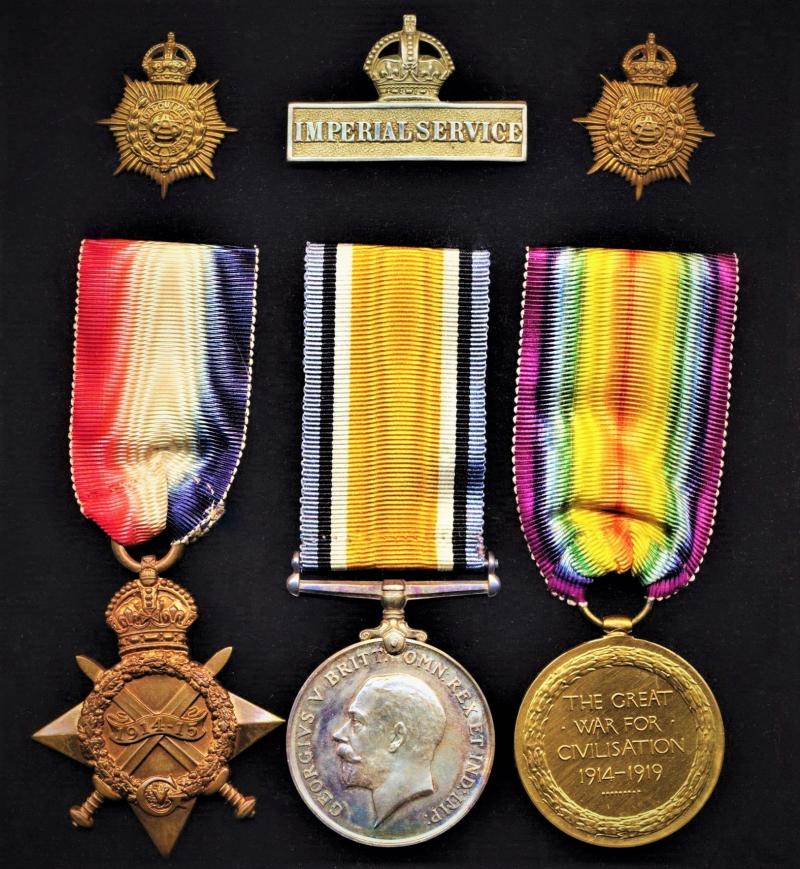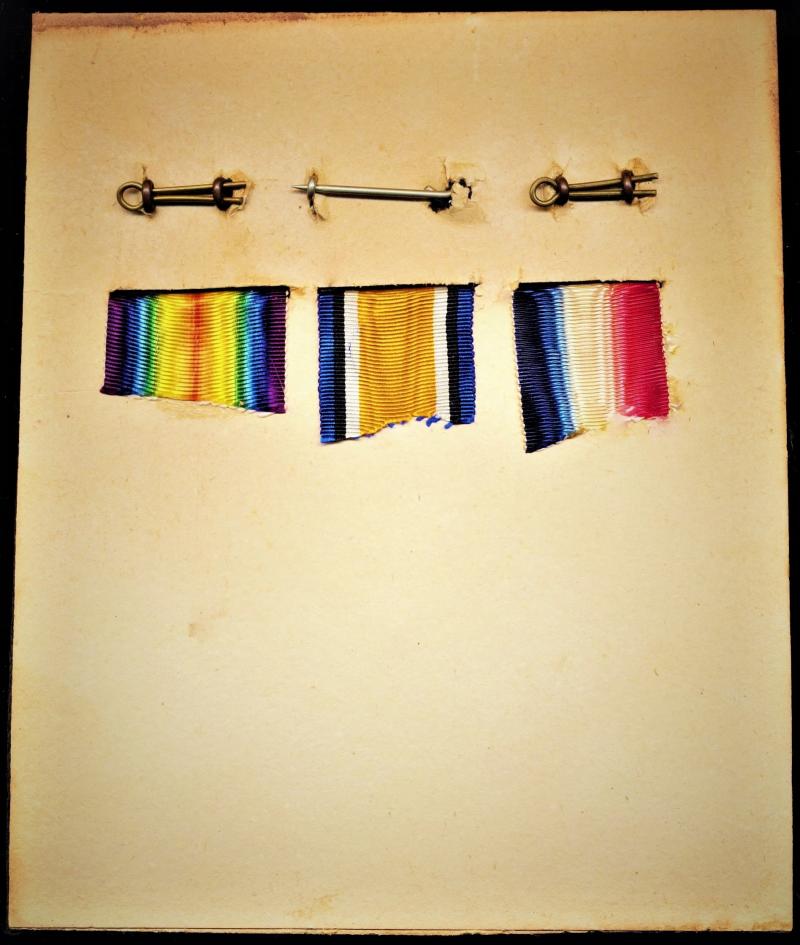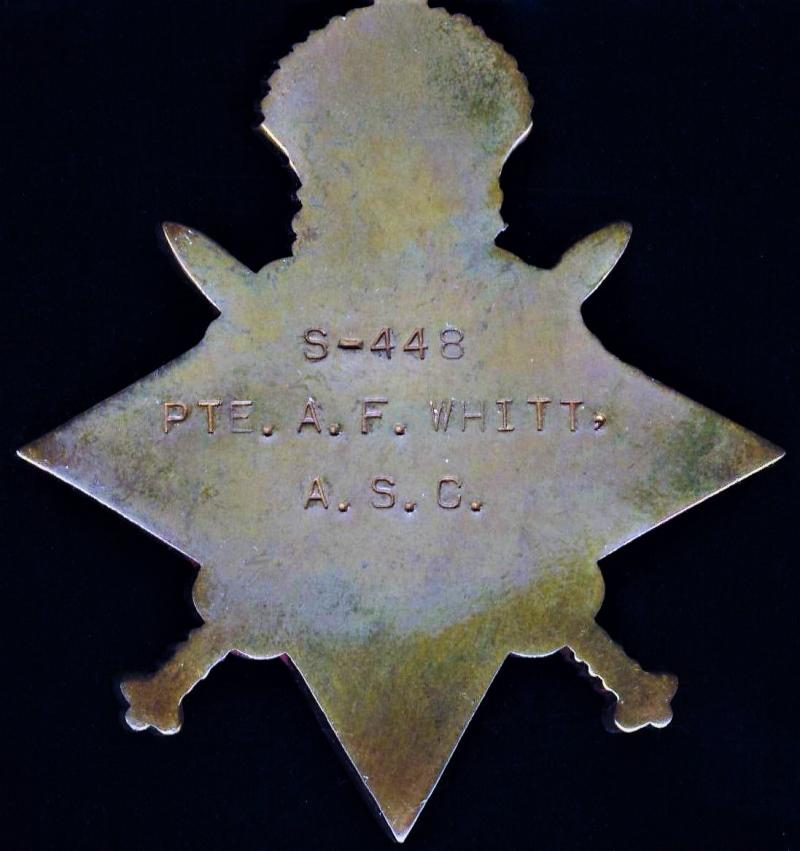A Great War campaign medal group of 3 with Territorial Force & regimental insignia: Private Archibald Freeman Whitt, 4th Company North Midland Divisional Train, Army Service Corps (Territorial Force)
- 1914-15 Star (S-448 Pte. A. F. Whitt, A.S.C.)
- British War Medal. Silver (S-448 Pte. A. F. Whitt, A.S.C.)
- Interallied Victory Medal (S-448 Pte. A. F. Whitt, A.S.C.)
Sold together with:
- Territorial Force: Imperial Service Badge
- Army Service Corps: Pair of 'Kings Crown' collar badges
Note: The medals mounted on their long lengths of original silk moire ribands, which together with the insignia mounted on a contemporary flock board
Important: All of the campaign medals verified per the respective medal rolls:
- 1914-15 Star: Ref WO 329/2900
- BWM & Interallied Victory Medal: Ref WO 329/2023
Imperial Service Badge: The pin-back white metal Imperial Service Badge that was awarded exclusively to qualifying members of the Territorial Force, was a short-lived item of insignia awarded to 'Territorials' who had pledged to serve outside of the United Kingdom in defence of the British Empire, in the event of national emergency. The conditions of enlistment for the Territorial Force, that had been created in 1908, did not allow for soldiers to be sent overseas on active service against the individual soldiers will, as the Territorial Force had been conceived as a 'Home Defence' force. However, any man could volunteer for the Imperial Service Sections of the Territorial Force, and serve abroad in times of war, which would qualify the volunteer to receive and wear the Imperial Service Badge. The Imperial Service Badge was worn above the pocket on the right breast of the uniform tunic The badge was formally instituted in 1910, and became obsolete in October 1921, in which month the Territorial Force was restyled as the Territorial Army
Archibald Freeman Whitt, son of Frank Whitt (Lace Manufacturer) & Elizabeth Ann Whitt (nee Howard) was a native of, Beeston, Nottinghamshire, England, where he was born on 21 June 1895. The 1911 National Census for England & Wales records Archibald, employed as an Accounts Clerk, and residing with his family, comprising parents and 3 x sibling elder sisters (Mabel, Florence & Violet) , at, The Limes, Gedling, Nottinghamshire, England. Archibald was a pre-war member of the Territorial Force, having attested for the Territorial Force at Nottingham, England, on, 1 December 1913. On enlistment, Archibald was posted to the Notts & Derby Brigade Company Army Service Corps
Archibald served with the 'Supply Branch' of the Army Service Corps - the letter 'S' prefix in his regimental number denoting he was enrolled in the 'Supply Branch' of the A.S.C.. On 25 February 1915, Archibald embarked aboard the S.S. Blackwell for theatre of war 'France' where he disembarked at Le Havre, France, on 26 February 1915. In France he served with 4th Company North Midland Divisional Train, Army Service Corps (Territorial Force) - subsequently serving under under higher formation 46th (North Midland) Division of the British Army. Archibald served with the British Expeditionary Force overseas n France & Flanders through to 28 February 1919. He was disembodied from service with the British Army on 24 May 1919
After taking his discharge from the British Army, Archibald returned to his civilian career and in the post-war years passed his professional qualifications to become a 'Chartered Accountant'. In 1923, he married Dulcie Robert Plamer, at Nottingham. Archibald Freeman Whitt, is recorded as having died in Nottingham, England, on, 13 January 1949
The recipients service papers are extant and accessible at The National Archives
The medals toned and the grouping of splendid appearance
Condition: EF
Code: 21312







